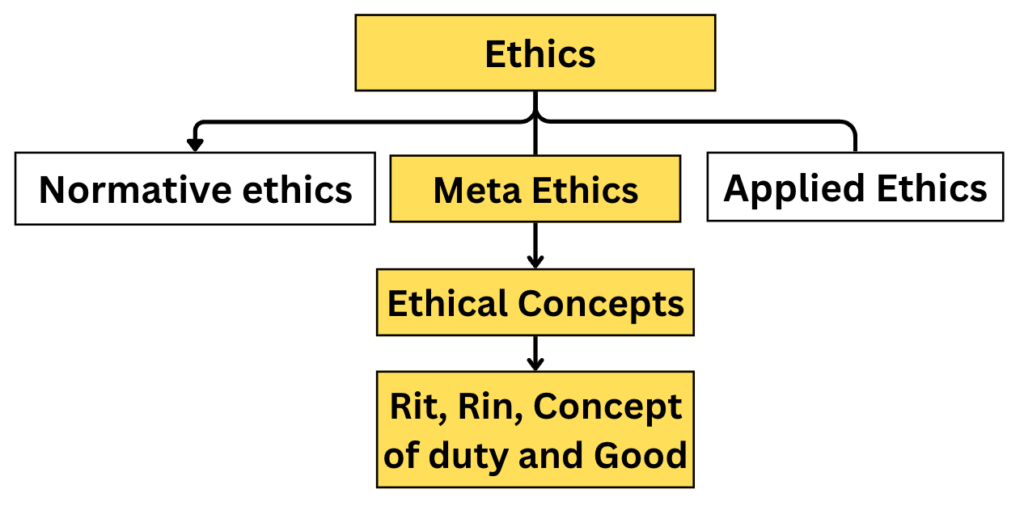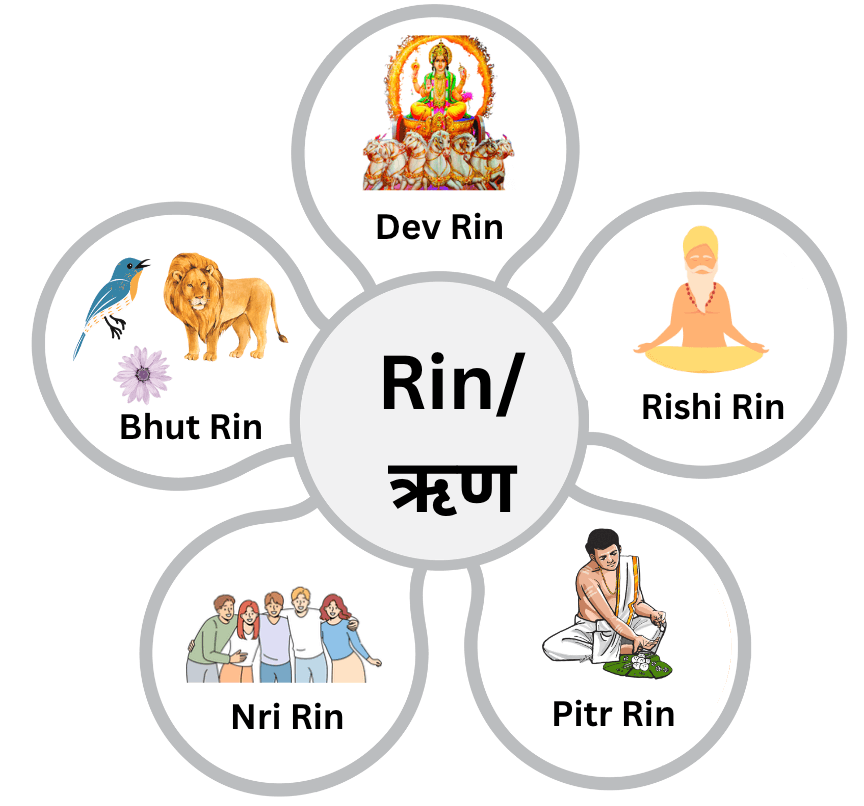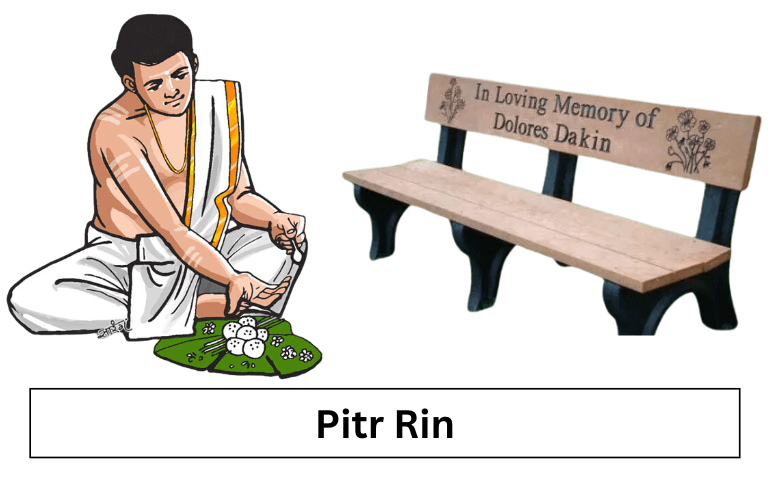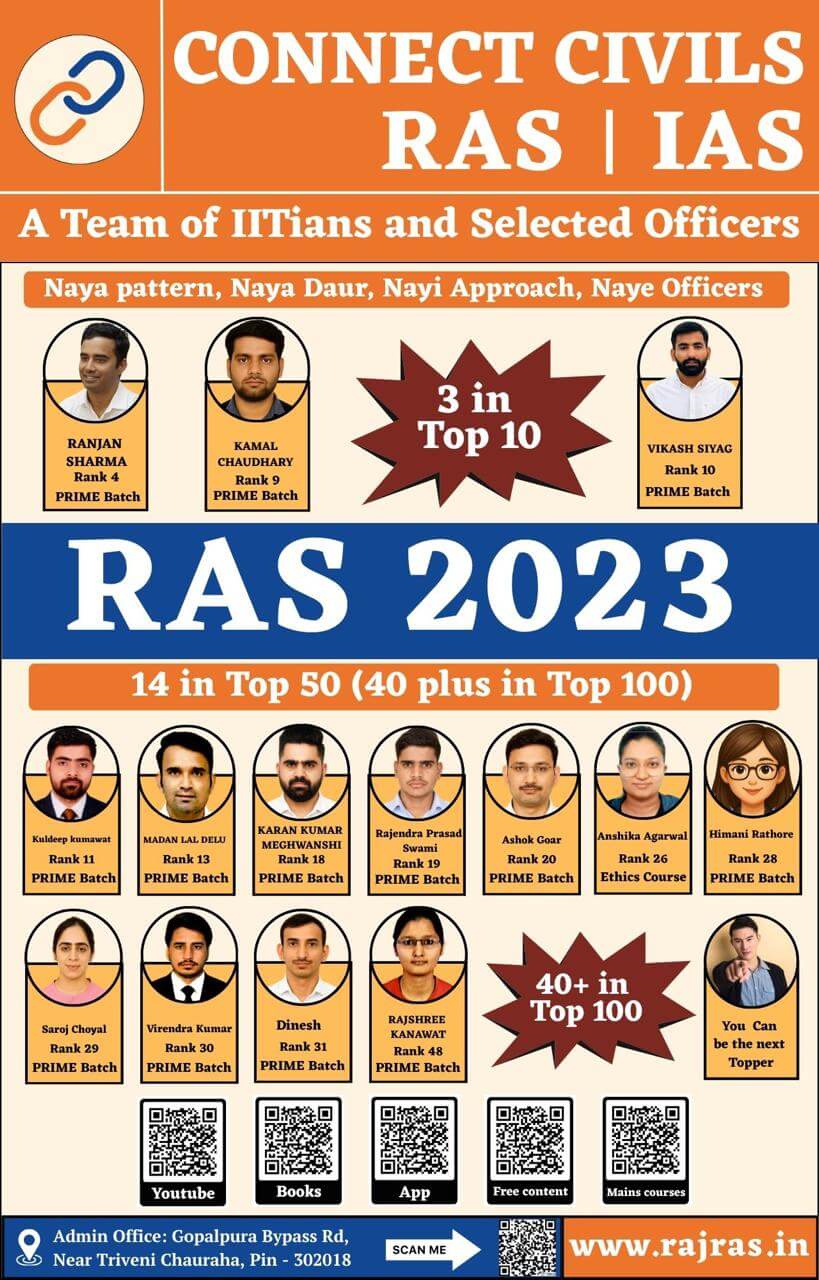Ethical Concepts: Rit and Rin & Concept of Duty In the subject of Ethics, the concepts of Rit (cosmic order) and Rin (moral obligation) form the foundation of ethical living in Indian philosophy. This chapter explores their characteristics, real-life application, and the evolving idea of duty across different philosophical traditions, highlighting their relevance in guiding human behavior.
Previous year Questions
| Year | Question | Marks |
| 2013 | Throw light on the concept of “Rina” in Indian tradition. | 5M |
| 2018 | How does the concept of “RIT” enhance administrative excellence ? | 2M |
| 2021 | Explain the relevance of the ethical idea of ‘Rina’ in administrative life. | 2M |
| 2023 | How can contemporary society benefit from the Vedic idea of ‘Rna’? | 5M |
Ethical Concepts
- Principles which discuss the origin of ethics and rightly guide human being’s belief, thoughts, attitude, behavior and action by putting reasonable restrictions on them.
- This is part of Meta ethics as the origin of ethical principles is discussed.
- Eg. – Rit, Rin, Concept of Duty, Good etc.

Rit/Ryt/Rita
- The concept of Rit originated in Rigveda and is mentioned in other vedas like Atharvveda and even Upanishads.
- It is the first example of human pursuit towards moral philosophy and origin of Indian ethical thoughts.
- Root word for Rit is ‘Ri’ which means movement. Hence Rit stands for an Organized movement.
- Rit means truth/right/righteousness or natural order which guide this universe.
- This order includes physical (Cosmological) and social/moral order.
- Physical orders – Solar system, Seasons changing, Gravitation force direction, menstrual cycle.
- Moral/social order – Dharma, Karma, Ashrams of life, Buddha’s Dhamma, Lao Tzu’s Tao (Path of virtuous conduct).
- In the modern scientific system, rit corresponds to universal laws.
- Rit is a path of Righteousness and truth (Radhakrishnan).
- Rigveda and Rit –
- Rig Veda 10.133.6 – lead us by the path of truth/order
- ऋतस्य यथा प्रेत – live according to natural rules (प्राकृत नियमों के अनुसार जीओ)
- ऋत का हिरण्यगर्भ – (Origin of Rit)
- God Vishnu is considered as originator of rit
- Varun is known as “Ritasaya Gopa” i.e drover of Rit
Characteristics of Rit

- It is beyond time and space.
- Rit defines the ideal i.e. Rit leads to what is right/proper.
- Hence Rit is the predecessor of Dharma.
- 3 Features of Rit –
- Gati – The continuous movement or change
- Sanghatan – A system based on interdependent parts (Harmony)
- Niyati – An inherent order of interdependence and movement
- Examples – Solar system, Seasons, 4 Stages (Ashram) of life Hence it represents the inherent harmony and balance in the world and emphasizes living in accordance with this order.
- Rit leads to –
- Ritualism (Doing something in a order)
- Reet (Traditions) – A practice of repeated work
- Ritu (Seasons)
- Rhythm – Order
Application of Rit
Rit advocates for order, harmony and lawfulness
Application –
- An administration has the responsibility to maintain the social order, peace and harmony in the society.
- Rit awakens environmental consciousness and a sense of gratitude ( It highlights the importance of maintaining harmony with oneself, others, and the environment for the well-being and prosperity of all).
According to rit, there is a supreme power or guiding power which runs this universe in an order without anarchy
Application –
- Similarly our constitution should be the guiding principle for an administrator.
- Surprisingly Indian democracy handles more than 80 crore voters in elections without any major chaos. This is possible only because of supreme guiding powers like the constitution, credible and strong judiciary and bodies like the election commission of India.
The real doer is Vishnu and even other Gods have to follow the rules of Rit
- Other gods are only instruments for this bigger cause
Application –
- This helps to kill the “I” or ego in a person
- No person is beyond laws (Equal protection of law and equality before law – Article 14)
- Eg. – Even the mighty sun is not beyond Rit
Going against rit leads to Sin.
- Rit of a human being is his true nature = Inefficiency or unrealized potential
- Anrita (अनृत) or Astya leads to Dukha (sorrow)
- Eg. – Gandhi Ji blamed untouchability for Bihar earthquake of 1934 (God’s punishment)
Application –
- Deeds like corruption, scams, stealing are against the true nature of a divine being and hence should be avoided.
- One must choose such an occupation which is according to his/her Rit (Nature)
- Eg. – Kota suicides (Overburdened students)
- Going against laws, Rules, code of conduct leads to suspension, loss of reputation or even jail
- Eg. – Chanda Cochar violated the rit (Norms) of Lending = Deeds Against her Dharma = Vikarma
Rit means natural order, which can be extended to an unknown.
Application –
- Hence rit can be used to discover unknowns like far galaxies, black holes etc।
- Finding patterns in cosmos – Rit leads to innovation, Curiosity and discovery।
Rit can’t be worshiped, it should only be followed.
- Rit is even bigger than gods (even Gods need to follow rit).
Application –
- Hence Rit encourages action rather than mere preaching.
- Rit rejects idleness rather promote activity.
ऋतस्य बधिराणि, कर्णानि ततर्द
- Rit promotes truth and awakens those who are sleeping
Application –
- Rit is even bigger than the truth. Truth is based on sense-generated knowledge. It is limited, but Rit is natural and unlimited.
- Rit is beyond space and time – Universal
- Means truth needs to be heard by even those who don’t want to listen it.
Rit is precursor to Dharma, karma and Rin.
Application –
- Dharma – Manifestation of Rita in religious, social and moral spheres of life.
- Eg. – Earth accepting path dictated by lord varuna means earth is following his dharma.
- Karma – Upholding dharma through one’s actions.
- Earth doing it daily means karma
Rin
Every human being gets easy access to many resources created by god. Hence in return he/she has an obligation or debt to repay.
- Types of Rin –
देवर्षिभूतापत्नृणां पितृणां –
- देव – देवताओं का (Rin towards gods)
- ऋषि – ऋषियों का (Rin towards Teachers)
- भूत – सामान्य जीवों का (Rin towards fellow beings)
- अप्तनृणाम् – मित्रों/ सम्बन्धियों/सामान्य मनुष्यों का (Rin towards relatives, friends)
- पित्णाम् – पितरों का (Rin towards ancestors)
- According to the Taittiriya Sanhita (6.3.10.5), a child is born with three debts to repay in his/her lifetime – Dev Rin, Rishi Rin and Pitra Rin.
- Another ancient Hindu scripture, Shatpath Brahman (1.7.2.1), added Nri Rin or Manushya-rin.
- Shrimad Bhagvatam added Bhuta Rin (Plants, animals and nature).

Dev Rin (देव ऋण)
Because we receive sunlight, earth resources, fresh air, water etc by our Gods (Devtas like Varuna, Indra, Surya, Apollo etc), hence we are indebted to these Gods (Devtas).
- Repay by – यज्ञेन देवेभ्यः – Performing Worship, Yagya.
- Eg. – Surya namaskar
- Major Ashrams – Vanaprastha and Sanyaas
Administration –
- Appeal to conserve the natural environment in the name of god
- Eg. – Sacred groves like Bani, Oran
- Eg. – To stop sand mining in Rajasthan tribal gods are invoked in Chambal
- Eg. – The Water (Prevention and Control of Pollution) Act, 1974.
- In the honour of god Varuna, Goddess Ganga (Namami Gange)
- Promotion of meditation and Yoga (Inclusion of Yoga in National Health Policy 2017)
- Religious tolerance
- Freedom of religion [Article 25-28]
- Awareness against superstition and dogmas
- Anti-Superstition and Black Magic Act 2013.
- Inculcating values propagated by our gods/messengers like peace (Quran), welfare state (Ram Rajya), Compassion (Jesus Christ), Sacrifice (Guru Nanak).
- Law and order during religious processions
- Eg. – Chht pooja to honour Sun (Surya Devta), Teja Dasmi
- Eg. – Muharram to honour the sacrifice the Imam Hussain
- Handling responsibilities in Devasthan Department
Rishi Rin (ऋषि ऋण)
We receive knowledge from Vedas, upanishads, Bible, Quran, secular Literature and our teachers. Hence we are indebted to them.
- Repay by-
- ब्रह्मचर्येण ऋषिभ्यः – Studying/acquiring knowledge/self study
- Those who read veda are considered as treasurer of knowledge
- Respecting teachers
- Propagating the knowledge
- Adding matter to existing knowledge
- Major Ashrams – Brahmacharya and Sanyaas
Administration –
- Studying constitution (Bare act), Laws, code of conduct
- Promoting values of secular literature like Geeta, Kabir vaani etc
- Implementing education policy decision in letter and spirit
- Eg. – New Education policy 2020
- Promotion of research and development in various fields.
- National teachers award (To Honor the teachers)
- Eg. – Asha Suman and Dr. Sheela Asopa from Rajasthan
Pitra Rin (पितृ ऋण)
Our very existence is because of our ancestors (includes both living and dead). Hence we are indebted to them for this life they gave us.
- Repay by –
- Procreation
- Fasting and Shradh Puja to honor a deceased ancestor (Pind Daan)
- Good Upbringing of children
- Taking care of parents
- Eg. – For example lord Ram followed the ideals of his ancestral lineage, Raghuvansh, by being loyal to his subjects and keeping his words at all cost. (रघुकुल रीत सदा चली आई , प्राण जाई पर वचन न जाई)
- Major Ashram – Grihastha Ashram
Administration –
- Keeping spaces related to pind daan clean and crime free [Eg. – Gaya, Varanasi, Prayagraj]
- Embracing the values given by forefathers in administration like Sardar Patel, T N Seshan sir, Satyendra dubey sir etc.
- Crowdfunding/trust – Making charitable donations in the name of the departed ancestors = Minimum govt, Max governance.
- Pilgrimage and tourism promotion.
- Eg. – In Rajasthan Pushkar is considered sacred for Pind daan (Lord Rama performed the pind daan of his ancestors at this holy place)
- Feeding Cows, dogs, birds – Compassion towards living beings.

Note –
- According to Manu-smriti (Verse 6.35) and Garud puran , a man can aspire to achieve moksha or liberation only when he has repaid the above three Rinas.
Nri Rin or Manushya Rin (नृ ऋण व मनुष्य ऋण)
A person is indebted to humanity at large.
- Repay by –
- Respecting every human being [Kant], Sarvodaya, Antyodaya, Gandhi’s Talisman
- Values like Compassion, Empathy, Humility, Humanity, social justice
- Giving food, Shelter, Clothes to fellow beings, Daan/charity
- Service of a guest (Hospitality) – अतथ पजनम (Vishnu Puran 2/95)
Bhut rin (भूत ऋण)
Since everything is made of Panch mahabhuta (including human body), every person is indebted to all flora and fauna made of this.
- Repay by –
- Contributing pollution free environment ( Keeping Earth, Water, Air clean)
- Conservation of flora and fauna (Aparigraha)
- Compassion towards fauna like water for birds in summer, admitting injured animals in veterinary hospital etc (Isha Vasyam Idam Sarvam)
ऋणानुबंध – If one does not pay his/her debt in this lifetime, then he/she must suffer at next birth by the hands of same people whose debt is not repaid.
Concept of Duty
- The word ‘duty’ means what is due, i.e., what one is bound to do or under an obligation to do.
- In other words, a duty means what one ought to perform as a moral being.
- It is a set of rules or instructions outlining the behavior that must be adhered to.
- Marcus Cicero (Roman philosopher) who discusses duty in his work “On Duties”, suggests that duties can come from different sources.
Duty according to different philosophies
Stoicism –
- Live according to Mother Nature
Greek Philosopher –
- Attaining virtues is duty
- Examples –
- Sophist says defending the truth by rationality is duty
- Socrates says gaining knowledge is duty
- Plato says maintaining harmony among rationality, emotions and bodily appetite is duty. (Justice)
- Aristotle – Following golden mean is duty
Immanual Kant –
- Doing Duty for duty’s sake
Bhagwat Geeta –
- Nishkam Karma
W D Ross
- Seven prima facie duties – Fidelity, Reparation, Gratitude, Justice, Beneficence, Self-improvement, Non-maleficence (avoiding actions that do harm)
Hinduism
- Following path of 4 Purusartha – Dharma, Arth, Kaam, Moksha
Jainism
- Living life according to mahavratas (5 Vows) – Ahimsa, Satya, Asteya, Brahmacharya, Aparigraha
- Pratikramana – Introspection
- Vandan: Respecting teachers and monks
Buddhism
- Following Dhamma (Path of Righteousness)
- Living life according to 8 fold path – Right livelihood, Right speech etc
Hierarchical classification of duties
Level – Individual
- Duty name – Moral duties
- Eg. – Expressing values like Compassion, Humility, Generosity and controlling desires etc
- If not followed – Self centric life – loneliness, apathy, depression etc
Level – Family
- Duty name – Filial duties ( Central aspect to the teachings of Confucius)
- Eg. – Duty of a son towards parents, Duty of husband towards wife and vice versa
- Western culture – Civic duties > Familial duties.
- Asian or oriental culture – Familial duties > Civil duties
- If not followed – Broken families, Divorce, Infidelity, Domestic violence, increasing old age homes etc.
Level – Organizational
- Duty name – Professional duties
- Eg. – Inculcating discipline, professionalism, no backbiting, Skill development etc
- If not followed – Inefficiency, loss, shut down, unemployment, scams etc.
Level – Society
- Duty name – Ethical duties
- Eg. – Duty to promote Cleanliness, Tolerance, Justice, Egalitarianism, religious duties etc
- If not followed – Chaos, communal riots, rebellion, communicable diseases (Unhygienic public spaces – Plague)
Level – state
- Duty name – Legal duties and Civic duties
- Eg. of legal duties – Duty to obey laws, rules and regulations
- Eg of civic duties – Paying taxes, Voting, good samaritan
- If not followed – Fine or Imprisonment, suspension, debar from service
Level – Constitution
- Duty name – Constitutional duties
- Eg. – The 42nd Constitutional Amendment Act of 1976, which created Article 51-A, added it. It lays out 11 fundamental duties for all Indian citizens to follow like – Promoting brotherhood
- If not followed – Civil war, Hung assembly, dictatorship, Violation of fundamental rights etc
Other Classifications of Duties
Positive and negative duties (John Rawls)
- Positive duties – Acts which should be performed.
- Eg. – Save life of others, Help poor
- Negative duties – Acts which are prohibited to perform.
- Eg. – Don’t harm anyone, Don’t abuse
Primary and secondary duties
- Primary duty – These duties are an end in itself and hence essentially unrelated to any other obligation.
- Eg. – Feeding child, Not to injure others (Ahimsa)
- Secondary duty – These are the duties whose main goal is to enforce another duty. These are instrumental in nature. These are also called Remedial duties.
- Eg. – Cooking, Paying damages for the injury caused
Self-Regarding duties/Obligations – To abstain from alcohol or suicide.
Natural and acquired duties
- Natural – Without any specification by any institution or body
- Eg. – Duty as a human being
- Acquired = Acquired duties are duties undertaken by individuals by virtue of something they have done, or as a particular relationship, which they might have with others.
- Eg. – Duty as a son, Father, Mother
Perfect and imperfect (Immanuel Kant) –
- Perfect duties – It expects individuals to discharge the incurred obligations as per the goal that is set at all times without any deviation. That means it should be followed in all circumstances.
- Eg. – Refrain from suicide
- Refrain from looting/stealing
- Imperfect duties – Not mandatory to follow.
- Eg. – Self improvement, Charity, Being smart.
Duty and rights
- It is assumed that when a person receives a right, they will also be subject to some obligations. Hence, Every right entails a corresponding obligation. Right of one is the duty of the other and Vice versa.
- Eg. – My right to clean the road is corresponding to the duty to throw garbage in the dustbin.
- Eg. – Right of a child to get better nutrition and upbringing leads to the duty of parents for the same.
- John Austin says that a party has a right when another has an obligation (Duty) to do.
- Sir John Salmond – A duty is an act which every citizen has obliged to perform, in furtherance of protecting the rights of the other people.
- The Supreme Court in the State of Rajasthan Vs Union of India case said that legal rights are correlatives of legal duties.
- Examples –
- Citizens have Right to Equality. State has duty, not to discriminate with anyone and provide equal opportunity of employment (Article 15)
- While Citizens enjoy fundamental right to freedom of religion (Article 25-28), they also have duty to promote harmony and the spirit of common brotherhood – Article 51A(e)
- Fundamental Right to a healthy environment (Article 21, M C Mehta Case), Fundamental duty to protect environment – Article 51A (g).
- M.K Gandhi – Begin with a charter of duties of man and I promise the rights will follow as spring follows winter.
Administration
- Right to get good perks and remuneration (Salary, Pension, Car, Home, Helper) leads to duty to serve citizens.
- Right to punish someone comes with duty to implement the rule of law
- Punishment should be in accordance with law, in proportionate with crime.
Practice Questions
| Question | Marks |
| Explain the concept of rit and it’s relevance in administration | 5M |
| Enlist all types of Rins and how these can help in administrative excellence. Explain | 5M |
| Duties and Rights are two sides of a coin” – Explain this statement with examples | 5M |
Ethical Concepts : Rit and Rin & Concept of Duty / Ethical Concepts : Rit and Rin & Concept of Duty/ Ethical Concepts : Rit and Rin & Concept of Duty/ Ethical Concepts : Rit and Rin & Concept of Duty
FAQ (Previous year questions)
Every human being gets easy access to many resources created by god. Hence, in return, he/she has an obligation or debt to repay. There are 5 Types of Rinas – Dev Rin, Rishi Rin and Pitra Rin, Nri Rin, and Bhuta Rin
Benefits to contemporary society –
Dev Rin –
Appeal to conserve the natural environment in the name of god
E.g. – Sacred groves like Bani, Oran
E.g. – To stop sand mining in Rajasthan, tribal gods are invoked in the Chambal
Eg. – The Water (Prevention and Control of Pollution) Act, 1974.
In the honour of god Varuna, Goddess Ganga (Namami Gange)
Promotion of meditation and Yoga (Inclusion of Yoga in National Health Policy 2017)
Religious tolerance
Awareness against superstition and dogmas
Anti-Superstition and Black Magic Act 2013.
Inculcating values propagated by our gods/messengers like peace (Quran), welfare state (Ram Rajya), Compassion (Jesus Christ), and Sacrifice (Guru Nanak).
Law and order during religious processions
E.g.. – Chht pooja to honour Sun (Surya Devta), Teja Dasmi
E.g.. – Muharram to honour the sacrifice the Imam Hussain
Rishi Rin –
Promoting values of secular literature like the Geeta, Kabir vaani etc
Implementing the education policy decision in letter and spirit
Eg. – New Education Policy 2020
Promotion of research and development in various fields.
National Teachers Award (To Honor the teachers)
Pitra Rin –
Embracing the values given by forefathers in administration like Sardar Patel, T N Seshan sir, Satyendra Dubey Sir etc.
Crowdfunding/trust – Making charitable donations in the name of the departed ancestors = Minimum govt, Max governance.
Pilgrimage and tourism promotion.
E.g. – In Rajasthan, Pushkar is considered sacred for Pind daan (Lord Rama performed the pind daan of his ancestors at this holy place)
Feeding Cows, dogs, birds – Compassion towards living beings
Nri Rin –
Respecting every human being [Kant], Sarvodaya, Antyodaya, Gandhi’s Talisman
Values like Compassion, Empathy, Humility, Humanity, and social justice
Giving food, Shelter, clothes to fellow beings, Daan/charity
Bhut rin –
Contributing to a pollution-free environment ( Keeping Earth, Water, and Air clean)
Conservation of flora and fauna (Aparigraha)
Every human being gets easy access to many resources created by god. Hence, in return, he/she has an obligation or debt to repay. There are 5 Types of Rinas – Dev Rin, Rishi Rin and Pitra Rin, Nri Rin, and Bhuta Rin
Rin
Relevance in administrative life
Dev Rin
Maintaining Law and order during religious processions
Appeal to conserve the natural environment in the name of god
Eg. – Sacred groves like Bani, Oran
E.g. – To stop sand mining in Rajasthan, tribal gods are invoked in the Chambal
Eg. – The Water (Prevention and Control of Pollution) Act, 1974
Rishi Rin
Implementing the education policy decision in letter and spirit
Pitra Rin
Embracing the values given by forefathers in administration like Sardar Patel, T N Seshan Sir, Satyendra Dubey Sir, etc.
Crowdfunding/trust – Making charitable donations in the name of the departed ancestors = Minimum govt, Max governance
Ex – Armstrong Pame
Nri Rin
Respecting every human being [Kant], Sarvodaya, Antyodaya, Gandhi’s Talisman = Treating every citizen with respect in office and helping them
Bhut rin
Conservation of flora and fauna
Compliance with the Environmental Protection Act 1986
The root word for Rit is ‘Ri’, which means movement. Hence, Rit stands for an Organized movement. Rit is a path of Righteousness and truth
Rit
Administrative excellence
Rit advocates for order, harmony, and lawfulness
An administration has the responsibility to maintain the social order, peace, and harmony in society
The real doer is Vishnu, and even other Gods have to follow the rules of Rit
No person is beyond the law (Equal protection of law and equality before law – Article 14)
Going against rit leads to Sin
Deeds like corruption, scams, and stealing are against the true nature of a divine being and hence should be avoided
Prevention of Corruption Act 1974
Mission Karmyogi to instill integrity
Every human being gets easy access to many resources created by god. Hence, in return, he/she has an obligation or debt to repay. This debt is called “Rina”
Types of Rin –
“देवर्षिभूतापत्नृणां पितृणां” –
“देव” – देवताओं का (Rin towards gods)
Because we receive sunlight, earth resources, fresh air, water etc by our Gods (Devtas like Varuna, Indra, Surya, Apollo etc), hence we are indebted to these Gods (Devtas).
“ऋषि” – ऋषियों का (Rin towards Teachers)
We receive knowledge from the Vedas, Upanishads, the Bible, Quran, secular Literature and our teachers. Hence, we are indebted to them
“भूत” – सामान्य जीवों का (Rin towards fellow beings)
Since everything is made of Panch Mahabhuta (including the human body), every person is indebted to all flora and fauna made of this.
“अप्तनृणाम्” – मित्रों/ सम्बन्धियों/सामान्य मनुष्यों का (Rin towards relatives, friends)
A person is indebted to humanity at large
“पित्णाम्: – पितरों का (Rin towards ancestors)
Our very existence is because of our ancestors (including both living and dead). Hence, we are indebted to them for the life they gave us.
According to the Taittiriya Sanhita (6.3.10.5), a child is born with three debts to repay in his/her lifetime – Dev Rin, Rishi Rin, and Pitra Rin.
Another ancient Hindu scripture, Shatpath Brahman (1.7.2.1), added Nri Rin or Manushya-rin.
Shrimad Bhagwatam added Bhuta Rin (Plants, animals, and nature).

